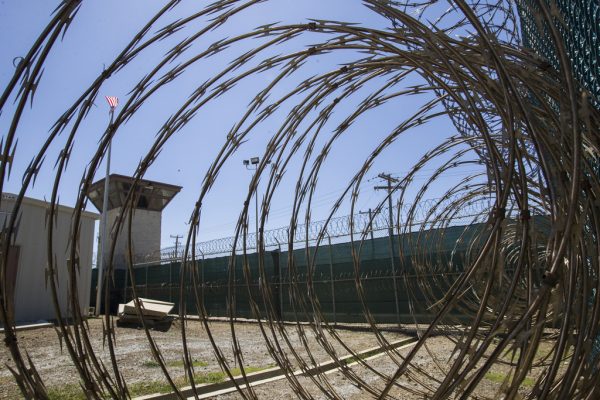What happens when three men are charged with murder, terrorism and conspiracy, but only one will potentially stand trial for the crimes?
As improbable as it may sound, this is exactly the scenario now projected to play out at the military commission at Guantanamo Bay Detention Camp in Cuba, following the news that two Malaysian nationals have reached plea agreements for their parts in the 2002 Bali Bombing that killed 202 people and the 2003 Marriott Hotel bombing in Jakarta that left 11 people dead.
Mohammed Farik Bin Amin and Mohammed Nazir Bin Lep have officially severed their cases from their co-accused, Indonesian national Encep Nurjaman, alias Hambali, and could be heading home to Malaysia early next year. In court filings released last week, a plea hearing has been scheduled to start on January 15 next year for both men.
The news of the possible plea deals has been circulating for some time, following a visit by a Malaysian delegation to Guantanamo Bay Detention Camp, which included Malaysia’s Home Minister Saifuddin Nasution Ismail. News of the visit was posted (and then deleted) on Facebook on September 25 when Ismail said that he had also discussed Farik and Nazir’s cases with Tina Kaidanow, the U.S. Special Representative for Guantanamo Affairs, while in New York on a recent trip to the United States led by Malaysian Prime Minister Anwar Ibrahim.
Diplomat Brief
Weekly Newsletter
Get briefed on the story of the week, and developing stories to watch across the Asia-Pacific.
Get the Newsletter
“I have met with two Malaysians detained there. Their story really touched me. It’s a downward spiral about life, about repentance, about the chance to be a better person. With God’s grace, we will try to expedite the process for them to return to Malaysia,” the post read.
Farik, Nazir, and Nurjaman were originally charged back in 2021 for their alleged roles in the Bali Bombings and the JW Marriott Hotel attack. They were arrested in 2003 in Thailand and sent to CIA black sites where they were tortured, according to a 2014 U.S. Senate Intelligence Committee report which is also referred to as the “Torture Report.”
In 2006, all three men were moved to the U.S.-run Guantanamo Bay Detention Camp, which once held some 780 prisoners, though now only 30 remain. Only 11 Guantanamo Bay detainees have ever been charged with a war crime, including Farik, Nazir, and Nurjaman and, of those 11, only one has been officially sentenced.
There are many arguments for the closure of Guantanamo Bay Detention Camp, a facility hastily erected after the 9/11 attacks as part of the United States’ “War on Terror,” including its aging prison population, with many of the detainees now suffering from severe illnesses from decades of incarceration and the torture they suffered at CIA black sites.
Advertisement
In June of this year, United Nations human rights investigator Fionnuala Ní Aoláin was allowed unprecedented access to the facility, which resulted in a scathing report that detailed how detainees had been subjected to “cruel, inhuman and degrading treatment,” which included deprivation of food and water, extreme sleep deprivation, and continuous noises while in detention.
The 23-page report also explained that the detainees had been waterboarded and undergone a torture technique known as “walling” where detainees’ heads were repeatedly struck against a wall.
In purely financial terms, Guantanamo Bay Detention Camp is also a white elephant, costing an eye watering $13 million per detainee per year.
Yet, despite the argument that the facility should be permanently shuttered, is it also right that the two Malaysians should be allowed to enter plea deals, return home, and leave Hambali holding the metaphorical bag for crimes that the authorities claimed were committed by all three men?
Ever since the charges were brought, the U.S. authorities have sought to paint Hambali, a senior member of the hardline Islamic group Jemaah Islamiyah, as the ringleader of the trio and the mastermind behind the Bali Bombing, while describing Farik and Nazir as “accessories” to the crimes. Yet the authorities made the decision to charge all three men together, which begs the question why two of them should be allowed to enter pleas and escape trial.
Perhaps the better question is why Hambali is not being afforded the same opportunity to reach a plea agreement as his co-accused?
It is not yet known if Farik and Nazir will give evidence against Hambali, although it is highly likely that this was part and parcel of any plea agreements offered to the two men, and a common stipulation of many plea deals in other similar cases.
As part of criminal cases all over the U.S., this kind of unsympathetic horse-trading happens every day, as prosecutors try to pressure one or more members of a group to give evidence against their co-accused in return for some kind of leniency.
This makes the latest development in this now 20-year-old saga unsurprising but, given the very nature of Guantanamo Bay Detention Camp and the treatment of the detainees over the past two decades, the new plea agreements will mark another dark chapter in this case if Hambali is left to face trial alone.
